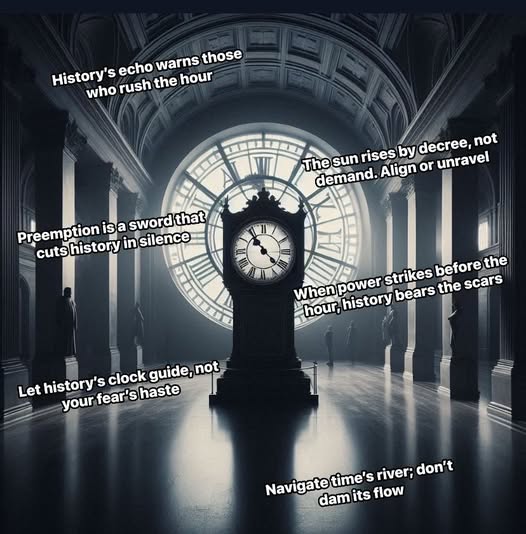
In a chamber outside of time — where history is neither past nor future but a living memory — there stood a peculiar clock. It did not count seconds or hours. Instead, it ticked in the rhythm of decisions: the ones made too soon, the ones made in haste, and the ones that echoed for generations.
On a spring day in the 21st year of the century’s third decade, Chancellor Regan Hart stood on a grand podium before a sea of flags and fervent supporters. He called the day “Freedom Day,” and announced a sudden and sweeping set of economic barricades—tariffs designed not to retaliate, but to preempt. “This,” he declared with grand authority, “is our declaration of economic independence!”
But the world was not a chessboard. As the dominoes fell, old allies grew quiet, powerful rivals retaliated, and back home, farmers, merchants, and consumers began to feel the silent squeeze. Chancellor Hart had struck the bell before the hour, certain the tolling would frighten rivals into submission. But time, like history, does not bend for bravado.
This was not the first time the old clock had shuddered before its time.
Two decades earlier, another leader — President Dalen Wexley — had faced the ticking tension of a shaken world. A foreign nation far across the sands was deemed a threat — dangerous, unpredictable, possibly armed with hidden terrors. Wexley chose not to wait. With drums of war and declarations of justice, he launched a preemptive strike.
But the smoke that rose from broken cities revealed no secret weapons. Instead, it exposed decades of misjudgment, igniting a storm that spread through the region and scorched the lives of millions. What began as a preemptive shield became a long, dragging shadow over generations.
Across the sea, Prime Minister Lionel Bray stood in firm support. “We must not wait,” he had declared. And so, his nation marched beside Wexley’s, convinced that action before proof was leadership. Others followed. The world, it seemed, had become enamored with the idea of leaping before looking.
And now, years later, Chancellor Hart echoed the same pattern — this time not with soldiers, but sanctions. Not missiles, but markets. But the clock in the chamber knew better. It had seen this before.
Preemption may carry the scent of strength, but it often grows from the soil of fear and pride. It declares danger before danger speaks. It draws lines before bridges are even built. It answers questions that have yet to be asked.
And so the old clock struck once more — not because the hour had come, but because those who held power thought they could bring the sun faster by ringing the bell.
But the sun does not rise by command.
History teaches us this: acting before the moment ripens often leads to bitter harvests. The world, in its complexity, requires not just courage — but the wisdom to wait. The strongest leaders are not those who strike first, but those who discern when not to.

